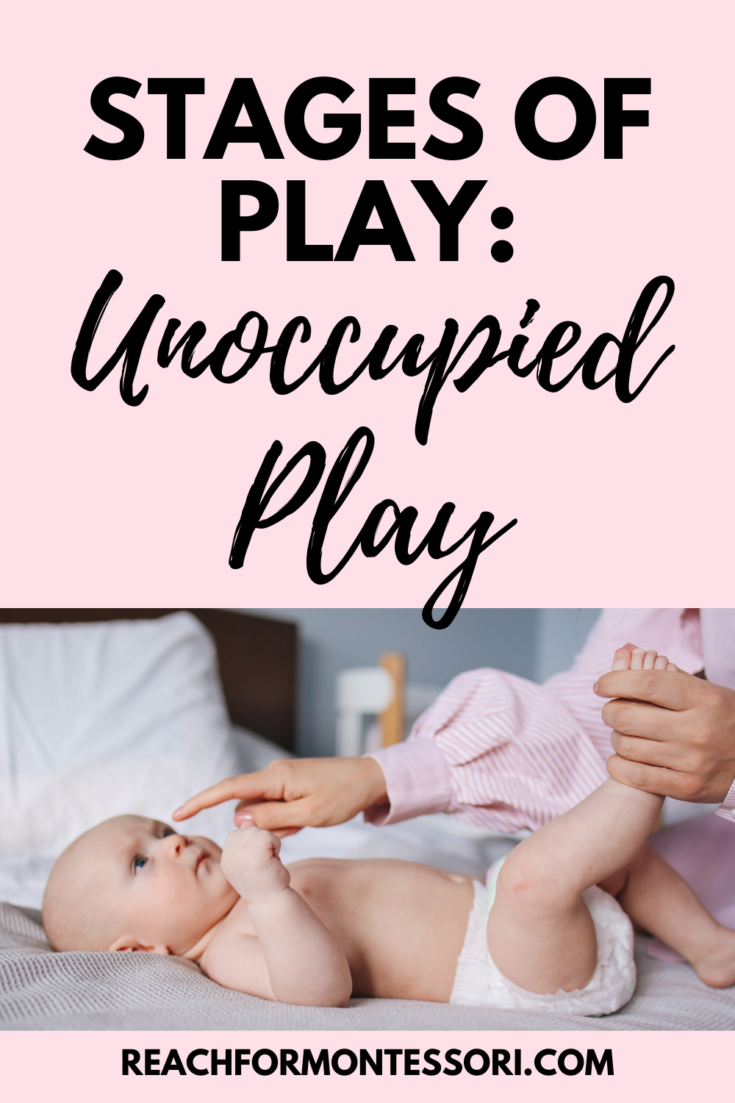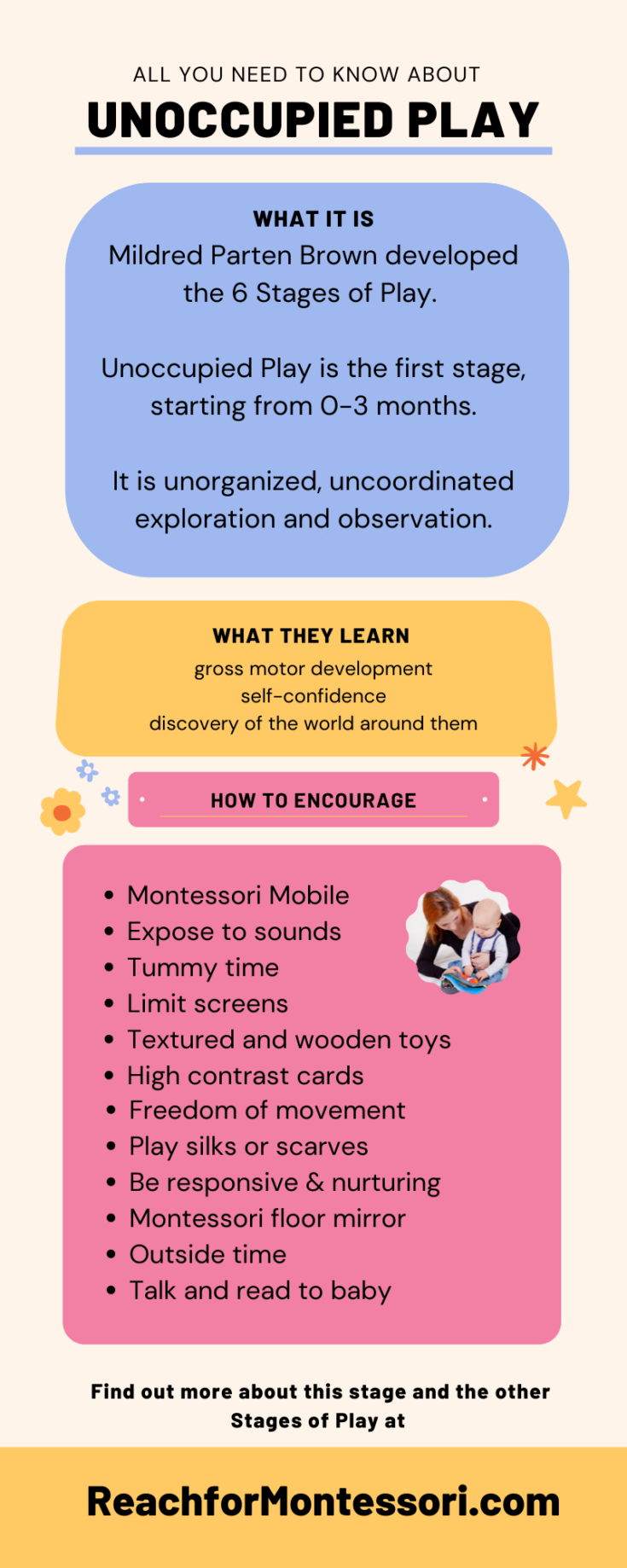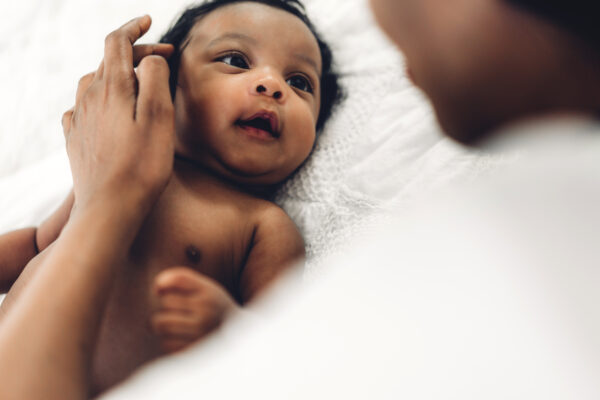In this article, you will learn all about the developmental stage of play called Unoccupied Play. You will learn what it is, at what age it occurs, and you will get some ideas on how to support this type of play in your young baby.
We focus so much on academic goals for young children, but we forget how much brain development occurs during PLAY. Specifically, in the first 5 years there is an explosion of growth in the brain.
What’s the best way to support this growth? Allowing PLAY. Specifically, FREE PLAY.
Free play is child-led and unstructured play. They are allowed the freedom to choose what and how to play and it is not extrinsically motivated.
Research has continually shown that free play is essential in early childhood development.

(This post contains affiliate links. Purchasing from these links costs you nothing extra, but helps with our website upkeep.)
What Is Unoccupied Play?
Unoccupied Play is the very first of sociologist, Mildred Parten Brown’s, 6 Stages of Play. The other 5 different types of play are:
- Independent play/solitary play
- Onlooker play
- Parallel play
- Associative play
- Cooperative play
You can read about the various stages of play here.
This first stage of play occurs the first few months, usually between 0-3 months – the early months of infancy. We may not think of newborns as “playing,” but they absolutely are!
During these first few months, they are mostly observing and exploring. Their movements start off as involuntary, uncoordinated and erratic.
Through this natural instinct to observe and explore, they are absorbing and learning about the world around them.
During unoccupied play:
- Gross and fine motor skills develop.
- They learn about the world around them. (cognitive skills)
- They build self-confidence.
- Problem-solving skills develop.
- Emotional skills develop.

What is an Example of Unoccupied Play?
Here are some examples of unoccupied play for reference, as it can be difficult to spot, as there often appears to be no clear purpose to the young baby's seemingly random movements.:
- A baby's arms wave in the general direction of a dangling toy as they smile, however, they don't engage further with the toy.
- A baby flaps their arms and kick their legs as they lay on a blanket on the floor.
- A baby watches as their hands splash in bath water and their attention quickly turns to something else.
How To Encourage and Support Unoccupied Play
While babies are born with the natural instinct to play, there are things you can do to support your baby’s learning during this stage.
This stage is all about encouraging natural brain and motor skill development so they can move on to the next stage.
As such, it’s vital to expose your newborn to new sounds, textures and experiences.
Here are 14 tips and toys to encourage your baby's development during the Unoccupied Play stage:
Activities to Support Unoccupied Play
Variety of Sounds
Things like rattles, jingle bells in a metal tray, or music playing can help stimulate cognitive development.
Tummy Time
Short spurts or laying your baby on your chest counts! Tummy time will help build their strength to become mobile and enter the next stage of play.
Here are some tips if your baby doesn't love tummy time.
Outside Time
Outdoor play is incredibly important for children, but we sometimes think it’s not as important for immobile newborns. But outside is an exciting experience!
Think about it; everything is new to this little being who has just come into the world. There are different smells, sounds and sights outside that they can’t experience inside.
Freedom of Movement
It’s important for gross motor development to allow floor play and to limit the use of “baby containers.” A Topponcino can be helpful during this time.
Once they start getting mobile, you can create a “Yes Space” to continue to allow this freedom.
Hold Your Baby
Studies show being a nurturing, responsive caretaker helps in healthy brain development. This article from Leelanau Children's Center shows the difference between the “thinking part” of brains of a healthy child versus a neglected child.
Babywearing can be a lifesaver, especially in those first few months.
Talk to Your Baby
There is a connection between the number of words a baby hears on a daily basis and their brain development. Narrate your day or sing songs to them.
No Screens
While we understand it’s tough to limit screens these days, The American Academy of Pediatrics recommends no screens under 18 months.
Reading Books
Reading to children is incredibly important: it fosters cognitive and social-emotional development. If you need some suggestions on what books to get your baby, we have a list here and here.
Reading is also great for budding language skills.
Toys to Support Unoccupied Play
Montessori Mobile
This toy has been developed specifically for eyesight development, and there are different options as the baby progresses. Check out our link here for instructions on how to DIY a Montessori-inspired mobile.

High Contrast Cards
Another great vision development tool. Here’s a fun DIY instructional.

Montessori Floor Mirror
A staple in a Montessori home for good reason. It helps develop their self-awareness, visual tracking and even gross motor skills as they try to reach toward their reflection.

Different Textured Balls
Balls like these from Infantino that have different textures and that double as something they can also chew on are great. Both my kids also loved an O-ball, because it was easy to hold.

Wooden Rattles and Toys
Wood offers another sensory experience; the feel and weight is completely different from plastic toys. A Skish toy is great for infants and Haba has some great wooden clutching toys as well.

Scarves and/or Play Silks
We love our play silks and my 3- and 1-year olds use them for all sorts of play. For infants, you can play peekaboo, or run the silk along their face or hands for fun sensory play – there are so many different ways to use silks.


Support Natural Instinct to Play
Most of the activities on this list are stimulating, so try not to do too many in one day: An overstimulated baby is not a happy one.
Infants are using their natural instinct to explore and play. By supporting them through this development, you’ll soon start seeing the next stage of play: Independent Play.

It was helpful.
Thank you.